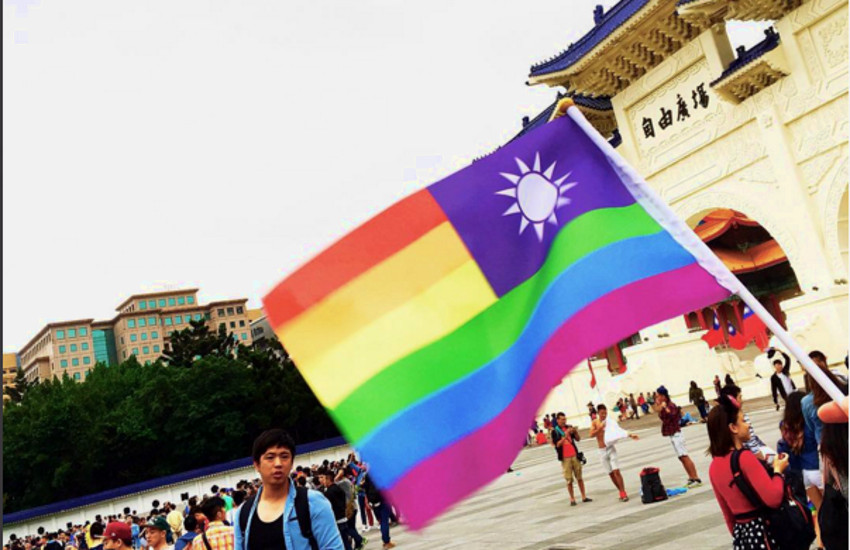Rainbow Taiwan flag at the Chiang Kai Shek Memorial Hall. | Photo via Instragram (charlesc1025)
After four years, the world’s most high-profile LGBTI sporting event has almost arrived.
The Gay Games will kick off in Paris on Saturday (4 August), where some of the world’s most highly trained LGBTI athletes will be vying to be the best in their field.
However during the lead-up to the games, the usually jovial and celebratory atmosphere was marred by the depressingly predictable resurfacing of tensions between competing nations, Taiwan and China.
China still considers Taiwan as part of its territory, and does not recognise its sovereignty. The dispute between the two countries often manifests during major sporting events, and this year’s Gay Games were not spared.
Late last month it was reported that China were pressuring the hosts and the organisers of the games to block Taiwan from flying the Taiwanese national flag, causing an outcry from Taiwan’s LGBTI community and sports fans. In the past, pressure from China on host nations of sports competitions has forced Taiwan to compete as under the titles ‘Chinese Taipei’ or ‘Taiwan (China)’.
‘The Gay Games is an interesting case’
Dr. Ian Chong, an Associate Professor of Political Science at the National University of Singapore and expert on international relations in the Asia-Pacific, spoke to GSN about why these tensions have resurfaced, and what it might mean for the Gay Games.
‘Sporting events tend to be high profile and many feature national teams,’ said Chong. ‘Beijing feels that to the extent that China can circumscribe Taiwan’s participation or representation, it can deny legitimacy to Taiwan or even erase it from the public mind.
‘The Gay Games is an interesting case. It has been getting increasingly more profile, so I can see why China wishes to diminish Taiwan’s presence there,’ Chong adds. ‘However, China isn’t the best on gender and LGBTI issues, so the degree it can win support may be in some question there.’
Taiwan is considered by many as the most LGBTI-friendly country in Asia
This is especially true when compared with Taiwan, which is often considered the most progressive country for LGBTI rights in Asia.
In a landmark case last year, the country’s top court ruled that the law which banned same-sex marriage was unconstitutional thereby setting the grounds for same-sex marriage legalisation. Last January, the Taiwanese government announced it would be adding a third gender to passports and national ID cards.
China’s pressure of censorship on the LGBTI-friendly state is something which would be all-to familiar to members of LGBTI communities, many of whom would have experienced censorship or attempts of subjugation in their lifetimes. ‘There are substantive issues of erasure, marginalization, and discrimination that non-cis gendered persons generally all too familiar with,’ said Chong.
‘A test of the organizers’ moral bearings’
‘Is the Gay Games now going to turn around and treat an entity in the same type of ways that they have historically been treated, have called out, and are rallying against? That will be a test of the moral bearings of the organizers and supporters of the Gay Games.’
There is no clear-cut choice for the organizers who will be facing mounting pressure from both sides. However, those involved in the games would be very much aware of obvious criticisms they set themselves up for should they capitulate to China’s demands.
‘There will be a lot of irony if a LGBTI rights events censors a place that has a decent record of supporting LGBTI rights,’ said Chong. ‘If the censorship does happen, the event organizers will be open to accusations of hypocrisy.’







